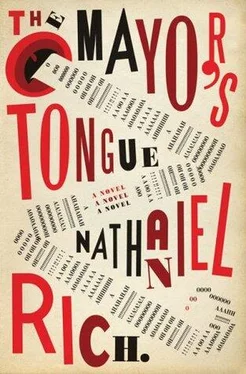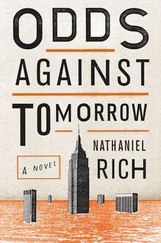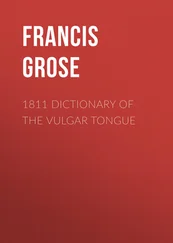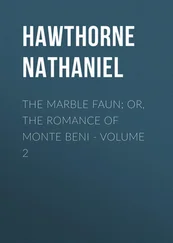Inwood was a foreign city, as far away from Manhattan as Eugene could travel — without actually leaving Manhattan. The neighborhood's geography was exotic, his friends were Dominican, and the meals Alvaro taught him to prepare induced dyspepsia in ways his childhood maid's traditional Italian cooking had never prepared him for. He saw no one he had known before moving there. His oldest friends knew where he was and what he was doing, but none of them lived in New York anymore, and he did not respond to e-mails from those few college acquaintances that had settled in lower Manhattan or in the subway-proximate neighborhoods of Brooklyn. In his more expansive moments, he fashioned himself a refugee, or at least some sort of psychic immigrant.
Eugene telephoned his father several times over the course of the summer, collect, from phone booths in Inwood. He could tell that his father was happy to hear a familiar voice, but neither one of them knew what to say. When he came home after college graduation, Eugene had told his father that he was moving to Florida, so in their conversations he made sure to mention his job as a lifeguard, his house near the beach, and the afternoon thunderstorms that would come and go without warning. He added that he had made some nice friends, though he said they were Cuban, not Dominican. His father would chuckle or make curt remarks, but reveal nothing about himself. He was alone in Eugene's childhood apartment on Sutton Place, enduring the first years of his early retirement in solitary, nostalgic reveries for the old world.
Unmoored and exuberant, Eugene made an effort to lose himself to the cadences of his new life. He purposefully worked erratic shifts at Aaronsen and Son, so that his life lacked any semblance of routine. In his spare time, he sat and read by the pond in Inwood Hill Park, or visited his friends on the moving crew, meeting their families and playing with their children. He bought Spanish instruction tapes and tried to practice speaking the language around the neighborhood — at the grocery store, in the library, and at bars with skeptical Dominican women — but found he was best understood when he spoke Italian.
One night, after Alvaro and Eugene had lived together for more than six months, Alvaro invited Eugene to visit his other apartment. Alvaro's two sons called him Tío Eugenio and showed him how they could carry chairs and tables over their heads. Alvaro's wife, Milagros, was strong and squat, with gentle facial features and shapely, carefully painted lips. She cooked pork neck in salsa verde and never made eye contact, though she often smiled in Eugene's general direction. For the occasion Milagros had laid out a white cotton tablecloth, and the boys' hair had been washed and combed. When Pepecito used his fingers to push corn niblets onto his fork, Milagros reprimanded him in a hushed voice. Otherwise, she was silent. Eugene figured she didn't speak English. She was from Santo Domingo, and did not know Cibaeño either, so Alvaro had to talk to her, like all the women in his life, in a deformed, pidgin Spanish.
After dinner, while Alvaro put the kids to bed, Milagros served Eugene a cup of sweet, highly concentrated coffee. When she sat down to join him at the table, her smile vanished. She surprised him by speaking, for the first time, in English.
"Uncle Eugene," she said, "I know about Alvaro's nurses. I have been to the hospital. They took my children out of my body and I let them. They have given my children private consultations. I let them."
"I'm sorry," said Eugene, trying to sip his coffee. "I'm sorry."
"I know that when he goes to sleep at your place, there are women present. I know that you allow this."
"I'm so sorry," said Eugene, his coffee cup gibbering on its saucer.
"I know you are not from here, but you are trying to live in this community. I know what Alvaro is capable of. I know what he can do with the shape of his body."
"No, please, God no, I'm sorry, it won't happen—"
"I want you just to know this: I forgive you. I forgive you." She smiled again. A red glow seemed to rush into all her features, coloring her cheeks, her ears, her nostrils, radiating out of her eyes.
"Thank you. Thank you," said Eugene, coffee splattering on his chin and neck. "Thank you—"
"Leave my house now," she said. "Don't return. My children will never look on you again."
Eugene stumbled out, but later that night, he was not surprised to hear Alvaro creep into their Inwood apartment. When Eugene peeked out of his room, he saw a shadow on the wall that resembled a cow giving birth — the trembling skull of a newborn calf, distending an elastic caul. Eugene was too tired to perform the necessary extrapolations. As he tried to fall asleep, he heard the shifting weight of the player piano, and the inadvertent tinkling of the keys.
By March, Inwood — once a vibrant pastiche of florid bodegas, clapboard religious centers, and exotic family-style cafés — had all the muted familiarity of a childhood closet, brimming with items discarded and worn from use. Eugene turned corners without looking for street names; he crossed avenues without checking both ways for traffic, relying only on his hearing and peripheral vision. The public library, housed in a blocky mansion built in the Dutch colonial era, now seemed the only logical architectural bridge between its neighbors on Broadway, the Doppiando pizza parlor and the El Encantar del Principe Hair Salon for Men. Even the shadowy forms of Alvaro and his women projected on the orange-lit wall of the living room seemed as innocent as the most rudimentary of shadow puppets. Instead of a bloody chrysalis or a birthing cow, he saw doves and panda bears.
Alvaro started spending a lot of time at the library, and one night Eugene decided to accompany him there. He followed Alvaro to the third floor, and then into the men's bathroom; through what appeared to be the middle stall was a hidden passageway that led into a private study. A long conference table filled most of the room's floor space, though an ancient bookcase and small stained-glass windows were reminders of a time when the mansion served as a summer retreat for a family of wealthy Dutch merchants on the Hudson River. Soon the two friends were sneaking in several nights a week, shortly before the library's closing time, and would stay there undetected, late into the night. When Eugene asked how he knew about this room, Alvaro pointed to the conference table and then to his sore back, and Eugene understood.
They sat at opposite sides of the false-wood table. Eugene spent his time there trying to get through the eccentric late-career short stories of Constance Eakins, whom he'd studied in college — his thesis had been titled "Eakins: The Man, the Myth, the Monster." (He got a B — the professor complained that Eugene had gone out of his depth in trying to take on the entire career of a writer so prolific.) Alvaro didn't read at all, but wrote obsessively on a yellow legal pad with a long blue pen, scrawling a chaotic, looping Cibaeño across the page.
One night, Alvaro started to read his writing aloud. Eugene couldn't understand a single word, but he loved the sound of Alvaro's voice, and lost all interest in the book he was reading— Eakins's Keftir the Blind and Other Stories. He played back the music of Alvaro's prose in his head, and started to suspect that his friend was a beautiful writer.
Alvaro looked up at Eugene, and spoke in his Cibaeño dialect.
"So? Did you like it?"
Eugene still couldn't understand a word his friend was saying, but he figured he could usually grasp the general idea. "That was nice, what you read," he said.
Alvaro nodded and brought over his writing pad. Eugene had not realized how much work he had done. Dozens of pages were filled with Alvaro's loopy, hieroglyphic scribbles. It was difficult to determine where words ended and began, since they were all cramped together, with little or no punctuation except for stray accent marks.
Читать дальше












